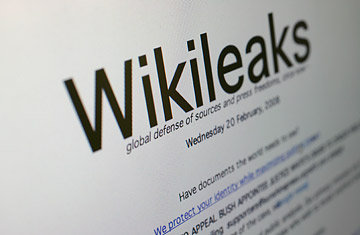
In a reversal that free speech advocates called a pivotal victory for First Amendment rights, the federal judge who shuttered the muckraking website Wikileaks last month ruled Friday that it could reclaim its Web address in the United States. The decision, however, raises another question: did a band of tech-savvy Internet mavericks manage to outmaneuver the law?
Early last month, a Zurich-based bank, Julius Baer, filed suit in U.S. District Court in San Francisco, claiming a disgruntled ex-employee had passed stolen internal documents to Wikileaks, a venue for anonymous whistle-blowers to post allegations of corporate or government misconduct. The site says those materials detail money laundering and tax evasion at Julius Baer's Cayman Islands branch. At the bank's request, Judge Jeffrey White issued an injunction sealing Wikileaks' U.S. address.
Since issuing the Feb. 15 ruling, White had weathered a hailstorm of criticism from public interest and media organizations, who denounced the order as an unconstitutional prior restraint on free speech and warned it could have a "chilling effect" on other organizations, who might become wary of facing similar suits if they chose to publish or host controversial material. Those critics also said the ruling could set a dangerous precedent for the Internet, a new frontier in the battle over free speech whose terrain remains largely uncharted. Of particular concern to free speech advocates was the scope of the injunction. "The initial order was the Cyberspace equivalent of shutting down a newspaper" because of one story, says Steven Shapiro, legal director of the American Civil Liberties Union. "It was unconstitutional and unenforceable."
On Friday White mainly agreed, and dissolved the injunction, effectively rebooting the site. The prior order "raises issues regarding possible infringement of protections afforded to the public by the First Amendment," he said. Beyond those issues, the judge expressed doubt that a Bay Area court held jurisdiction over a squabble between the Cayman Islands branch of a Swiss bank and a global confederation of whistle-blowers whose Net domain is owned by John Shipton, an Australian national residing in Kenya.
He also sounded notes of frustration with officiating a high-stakes contest in which one team's players are essentially invisible. Wikileaks' founders — an international cadre of "Chinese dissidents, journalists, mathematicians and start-up company technologists" who are themselves anonymous — were a moving target for White. Despite his order, the site's cache of more than 1.2 million documents — among them, a U.S. operations manual for its Guantanamo Bay, Cuba facility — had been readily available at several mirror locations around the world, including domains registered in Belgium, the Christmas Islands and Germany, and at its numerical IP address. "The cat is out of the bag," White conceded. He also acknowledged the injunction had backfired, kindling publicity for Wikileaks and driving traffic to its mirror sites.
While the case remains open, Friday's ruling should "discourage other potential litigants from trying to use tactics like this," says Matt Zimmerman, a senior staff attorney with the Electronic Frontier Foundation. Zimmerman notes that Dynadot, the site's San Mateo, Calif.-based domain registrar and a target of the injunction, is shielded from liability by the Communications Decency Act of 1996. William Briggs, an attorney representing Julius Baer, says the bank's only goal was to safeguard confidential information. Censorship, Briggs says, was never an objective. "The judge's ruling may herald the end of privacy rights as we know it," he told TIME. "The federal court has abdicated its role as a protector of individual rights by saying it can't protect those rights if, somehow, that information gets out on the Internet."
Paul Alan Levy, an attorney for Public Citizen, called Friday's ruling a "great victory for the First Amendment." But it also highlights a fact that might unsettle others in his line of work: wielded deftly, technology is a weapon powerful enough to beat the law.
